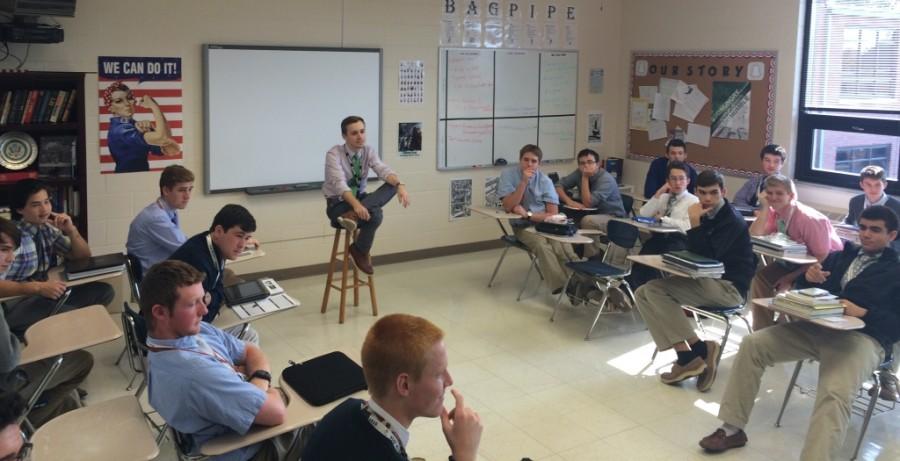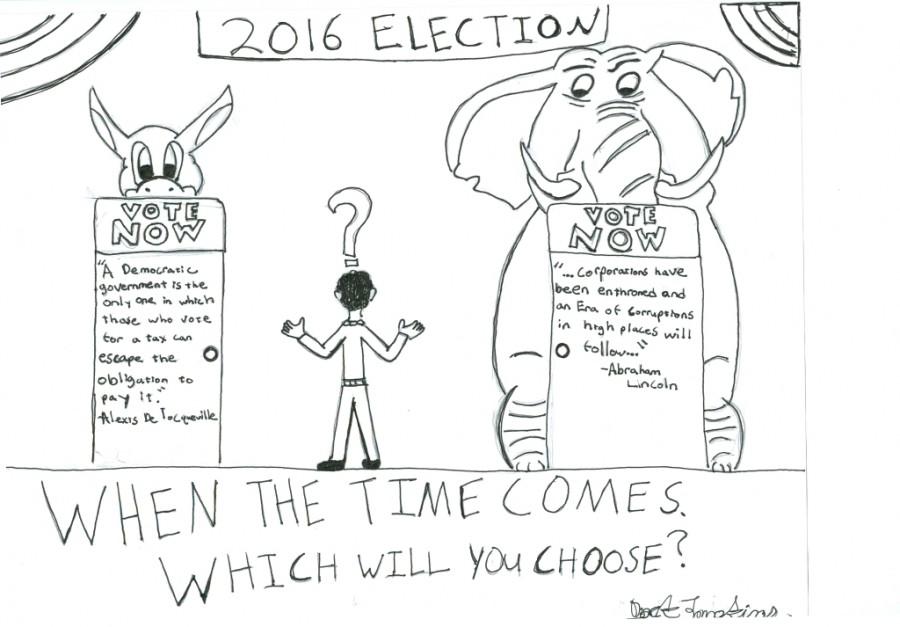Politics Becoming Reality for Class of 2016
November 20, 2015
Names like Donald Trump and Hillary Clinton make headlines, but do seniors in high school really care? Yes, say some Trinity seniors who have been watching closely the race for our nation’s next leader.
How will seniors form their opinions for the first presidential election in which they can vote?
Senior Antonio Clements said some of his political ideals come from his parents. He said, “My parents definitely have a heavy influence on my political views, but I’m also a part of speech and debate so I get to see a lot of social justice issues from that. My political views tend to be a bridge of the two.”
Senior Michael Morris said he forms his political views on his own, using information he finds himself. “I use Politico probably the most, and I use Fox News and CNN sometimes. I download the apps for all the news sites and look at them,” he said.

Trinity teacher Mr. Parker Whitehouse talks with his history class.
Trump and his somewhat controversial statements have been a large reason why this political race has gained more attention than usual. Senior James Moremen thinks this can be a good thing for politics as a whole.
He said, “Donald Trump is a reality show star, and he’s made the election basically a reality show. It’s enjoyable to watch, but it seems less serious than past elections, which I think can be a good thing because politics can also be boring.”
Morris thinks that Trump’s success in the business world probably won’t translate to the political world. He said, “I think that there is a certain value in experience, and a lot of the candidates that get attention on the Republican side have very little to none in terms of political experience. Donald Trump is one of those people. Carly Fiorina, Ben Carson and Ted Cruz have very little political experience. It’s certainly not any executive experience. Business success doesn’t mean political success.”
The other candidate with a fair bit of controversy has been Clinton. Despite her perceived faults, she is still a front runner in the minds of several seniors. Senior Jorge Rojas-Ortega said, “I think Hillary is definitely the strongest Democratic candidate, and even though she has had a history of certain issues with her image, she is very good diverting the conversation away from them and managing the situation.
“I think regardless of personal opinion, she’s so adroit at debate and addressing other people that in the long run she could probably beat the new Republican (candidate) just because she’s so good at making others sound stupid, for better or for worse.”
Morris thinks Clinton’s ego can hurt her in her pursuit for the Democratic nomination. “I will say I have several problems with Hillary Clinton,” Morris said, “but the real thing that I see that might get to the voter is the sense of entitlement towards the presidency. I don’t think they (voters) really like the idea that she is the clear front runner. On the Republican side they’re competing over a candidate. The Democratic party is not competing over a candidate, really, and I think that’s why people are moving towards Bernie Sanders, somewhat. I think they will gravitate more away from her if she continues that attitude.”
The 2016 presidential race is unique because of the number of candidates with little political background. Rojas-Ortega thinks these people can be seen as serious contenders because of the state of politics at the moment.
He said, “I think in response to the last two Congresses, which have been tremendously ineffective, there’s a lot of distaste towards the establishment, both in the Democratic and the Republican aisle in Congress. A lot of political figures now, like Donald Trump, Ben Carson, Fiorina and Sanders, who were seen as outsiders, are polling so well in comparison to what we would expect because everyone is so fed up with politics as usual — especially in the way they have worked in the dawn of the Affordable Care Act, how the government shut down and all of those things that simply didn’t work out.”
Aside from names like Trump and Clinton, there is always a possibility of a dark horse coming up and winning the election. For senior Nick Sortor, that dark horse is Fiorina. Sortor said, “(Fiorina) can oust the currently charging stallion Hillary once (Hillary) is indicted.”
Rojas-Ortega’s thinks Ohio Governor John Kasich can steal the election. Rojas-Ortega said, “John Kasich from the Republican Party balanced Ohio’s budget. Conservative in a lot of economic issues, he pairs up with a lot of millennials, so I think that he could definitely steal the Democrats’ thunder if he were paired with, say, Marco Rubio.”
Some seniors already have a good idea of how they will vote when November 2016 rolls around.
Morris says he will likely vote for the Republican side. “I lean to be a little conservative,” he said, “and I think I would end up probably voting for the Republican candidate. But, of course, if that would be Donald Trump, I don’t think I would, or even Ben Carson or Carly Fiorina – I don’t necessarily want an establishment candidate; I just want a candidate that has political experience and a record. That is why I support John Kasich, that is why I support Marco Rubio more so than certain other candidates in the field.”
Rojas-Ortega says he will vote for the Democratic ticket unless a particular pairing gets the Republican nomination. “For the Republicans, Rubio and Kasich might make me swing and vote Republican because that would be a really good ticket,” Rojas-Ortega said.
Moremen said he will likely vote for neither the Republican nor the Democratic ticket.
He said, “Unless one of the select few Republicans were to get the nomination, I’m probably leaning towards the Libertarian candidate, which will most likely be Gary Johnson.”
A Look Back at the Race for Governor
— A Look Ahead at 2016
by Jacob Ferree
Staff Reporter
BEVIN WINS! Nov. 4 headlines trumpeted the victory by Matt Bevin over Attorney General Jack Conway. This race came a year before I and other seniors will help elect a new president.
The presidential election of 2016 will be my first opportunity to cast a vote in a general election. While presidential elections often gather the most attention (and most money), elections on the state and local level are equally important. Observing what happened in 2015 may help in deciding who to vote for in 2016.
Our founding fathers knew the importance of our state and local governments. They drafted the Constitution to protect and preserve their sovereignty.
There are many reasons why local elections are important. Local elections represent the issues most relevant to a specific community. For example, coal legislation may be near and dear to an eastern Kentucky community, but it wouldn’t resonate with a California district. State government brings attention to our specific needs.
Mr. Parker Whitehouse, who currently teaches AP government and AP U.S. history at Trinity, is well versed in current political topics and the candidates. Whitehouse said local elections have a greater impact on Kentucky than the presidential election.
He said, “I’m a big believer in Olson’s law when it comes to our representative system: ‘The larger the group, the less likely there is an identifiable common good.’ Unfortunately, we’ve become more enchanted by our horse-race style politics of the presidential election and don’t pay enough attention to our local elections. The smaller the group represented, the higher the chance that their representation directly impacts their lives. The president’s actions impact people a lot less than they think, while governors and local politicians impact us far more than most understand.”
The election between Republican Bevin and Democrat Conway had very distinct issues concerning ways to change Kentucky for the better. Oddly enough, the hot issues Bevin and Conway debated over the last several months were some of the same topics discussed in the presidential race: the economy, early childhood education and marriage equality.
Bevin and Conway’s differing visions of what makes a healthy economy fell along party lines. Bevin believes that a less intrusive government (reduced regulations, taxes, minimum wage legislation, etc.) is the way to jump start a lagging Kentucky economy. He feels that job creation belongs in the hands of the private sector. Conway, on the other hand, favors a minimum wage hike as a way of sparking the economy.
Early childhood education and Common Core standards have been fiercely debated across the nation. True to the conservative position, Bevin said that states should move away from these standards. While Bevin agrees that metrics and standards are needed, he said, “Common Core has failed to make students competitive globally.”
Conway was a proponent of Common Core standards. He conceded, however, that there is room for improvement. He said, “If it needs to be tweaked, let’s tweak it from the local level.”
In terms of marriage equality, neither Bevin nor Conway brought as much attention to the topic as another Kentuckian – Rowan County Clerk Kim Davis.
Davis made national headlines by ignoring a Supreme Court order and denying marriage certificates to same-sex couples.
Bevin holds a conservative view of marriage but believes that the court order must be upheld. He also said the state should protect the county clerks’ religious rights. He proposed creating an online marriage license that does not require a signature.
Conway said officials like Davis have an obligation, by oath of office, to uphold the laws of the state/nation. Conway said soon after the incident, “I understand that passions are high on both sides of this issue, but we are nation of laws and no one can defy an order from a federal judge.”
Watching Bevin and Conway debate and fight for votes across Kentucky, makes me eager to watch the presidential candidates battle it out through 2016.


